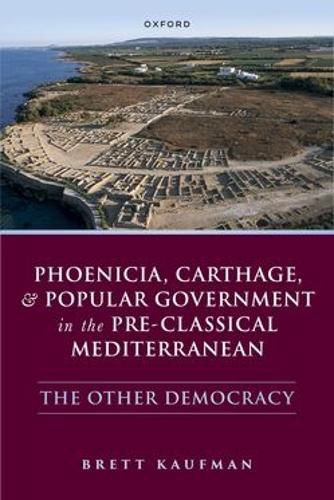Readings Newsletter
Become a Readings Member to make your shopping experience even easier.
Sign in or sign up for free!
You’re not far away from qualifying for FREE standard shipping within Australia
You’ve qualified for FREE standard shipping within Australia
The cart is loading…






From Aristotle to John Adams, great minds of government have revered Carthaginian democracy as the purest expression of a people's will. Yet today, while Phoenician influence on the Graeco-Roman worlds has been revisited and corrected from the perspectives of art, architecture, industry, crafts, and writing systems, the sphere of government in general and constitutional democracy in particular are still largely, and incorrectly, considered to be purely within the preserve of ancient Greece or Athens.
This book is the first comprehensive treatment of Phoenician government, drawing on archaeological, epigraphic, and historical sources. The Phoenicians introduced a brand of state-level society that enfranchised not only men, but also women, children, and even slaves into the popular assembly. Phoenician governmental leaders fostered a foreign and domestic policy that emphasized development, political stability, and economic growth insured by mutual incentives, as well as shared ritual practice, marriage alliances, social mobility, and concern for commoners, at home and abroad. This sustainable form of global leadership lasted for around eight centuries (~1000-146 BC).
This work in no way attempts to diminish the exceptional Athenian democracy and its subsequent positive effects on political history and the peoples who have benefited from its legacy. Rather this work amplifies ancient Greek democracy to help us better understand its origins, as well as expanding democratic heritage. In turn, it serves as an historical corrective that recenters democracy as a conversation and a competition between peoples as opposed to a monolithic institution. It highlights an alternative model of imperial democracy.
$9.00 standard shipping within Australia
FREE standard shipping within Australia for orders over $100.00
Express & International shipping calculated at checkout
From Aristotle to John Adams, great minds of government have revered Carthaginian democracy as the purest expression of a people's will. Yet today, while Phoenician influence on the Graeco-Roman worlds has been revisited and corrected from the perspectives of art, architecture, industry, crafts, and writing systems, the sphere of government in general and constitutional democracy in particular are still largely, and incorrectly, considered to be purely within the preserve of ancient Greece or Athens.
This book is the first comprehensive treatment of Phoenician government, drawing on archaeological, epigraphic, and historical sources. The Phoenicians introduced a brand of state-level society that enfranchised not only men, but also women, children, and even slaves into the popular assembly. Phoenician governmental leaders fostered a foreign and domestic policy that emphasized development, political stability, and economic growth insured by mutual incentives, as well as shared ritual practice, marriage alliances, social mobility, and concern for commoners, at home and abroad. This sustainable form of global leadership lasted for around eight centuries (~1000-146 BC).
This work in no way attempts to diminish the exceptional Athenian democracy and its subsequent positive effects on political history and the peoples who have benefited from its legacy. Rather this work amplifies ancient Greek democracy to help us better understand its origins, as well as expanding democratic heritage. In turn, it serves as an historical corrective that recenters democracy as a conversation and a competition between peoples as opposed to a monolithic institution. It highlights an alternative model of imperial democracy.